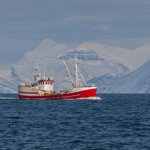French boycott hurting Scottish seafood sector

As the Scottish seafood industry continues to feel the pain of the COVID-19 lockdown, fishermen are railing against boycotts of their products in France.
Mike Park, CEO of the Scottish White Fish Association, said a “buy-local” movement in France spurred by the coronavirus has resulted in French retailers spurning Scottish imports.
“Unfortunately, the small volume of exports of species such as hake and anglerfish that we have managed to maintain, has been disrupted following protests by Breton fishermen, who have succeeded in persuading some local retailers to boycott our fish,” Park told SeafoodSource.
In a statement, Park’s association called on its French colleagues “to step back from this agenda.
“Far more will be gained from working together than operating in isolation,” it said.
In response, a spokesperson for France’s embassy in the United Kingdom told Scotland’s Press and Journal newspaper the French market has not been closed to U.K. seafood products.
“On the specific issue of whether French retailers have refused Scottish fish under pressure from French fishermen, we have no knowledge of such reports,” the spokesperson said. “In any case, the French state does not intervene regarding, and has no information about, contracts made by distributors in France, which are private transactions. In the current difficult situation in Europe and worldwide, it seems important to give priority to calming things down.”
Park said his members are finding the current situation the toughest period they have ever known, with the collapse of some markets and severe reduction of demand from others, which has forced boats to tie up.
“Every economy in the world is trying to support markets where they can to ensure there isn’t a complete collapse in economic activity. Yet some French retailers think it is acceptable to boycott produce, with the result that prices for Scottish fish have slumped. Ridiculous. Now [is the] time to be resolute in the defence of our interests while working together to ensure common sense prevails,” Park tweeted to his many followers.
Park said skippers and crew are desperate for a return to normalcy, although they recognize that recovery will not be easy or swift. The nephrops sector in particular, which traditionally supplies into the high-end foodservice sector, faces an uphill battle due to its heavy reliance on the foodservice sector for sales.
“In normal times, Scotland’s fishing ports are bustling with activity. Boats, from the smallest crabbers to the largest whitefish vessels, land their fish and shellfish, refuel, reprovision and head straight back out to the fishing grounds,” Park said. “Right now, the restrictions imposed by governments across the continent because of the COVID-19 pandemic have obliterated the fleet’s traditional markets, and there is an eeriness and an unnatural quiet in the harbor.”
The Scottish government has stepped in with an aid package for the shellfish sector, but has been slow to agree a package for the whitefish vessels, according to Park.
Park also pointed out that more than 120 non-U.K. vessels have been fishing in the waters north of Scotland while the Scottish fleet is tied up, meaning much of the fish being landed in France is actually originating from Scottish waters. That, he said, has added fuel to the U.K.’s calls for full control of its waters in the ongoing Brexit talks.
Photo courtesy of Roy Henderson/Shutterstock






Share